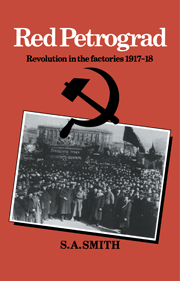Book contents
- Frontmatter
- Contents
- Acknowledgements
- Introduction
- 1 A profile of the Petrograd working class on the eve of 1917
- 2 The tsarist factory
- 3 The February Revolution: A new dispensation in the factories
- 4 The structure and functions of the factory committees
- 5 Trade unions and the betterment of wages
- 6 The theory and practice of workers' control of production
- 7 Deepening economic chaos and the intensification of workers' control
- 8 The social structure of the labour movement
- 9 The October Revolution and the organisation of industry
- 10 The economic crisis and the fate of workers' control: October 1917 to June 1918
- Conclusion
- Notes
- Bibliography
- Index
10 - The economic crisis and the fate of workers' control: October 1917 to June 1918
Published online by Cambridge University Press: 11 January 2010
- Frontmatter
- Contents
- Acknowledgements
- Introduction
- 1 A profile of the Petrograd working class on the eve of 1917
- 2 The tsarist factory
- 3 The February Revolution: A new dispensation in the factories
- 4 The structure and functions of the factory committees
- 5 Trade unions and the betterment of wages
- 6 The theory and practice of workers' control of production
- 7 Deepening economic chaos and the intensification of workers' control
- 8 The social structure of the labour movement
- 9 The October Revolution and the organisation of industry
- 10 The economic crisis and the fate of workers' control: October 1917 to June 1918
- Conclusion
- Notes
- Bibliography
- Index
Summary
FROM WORKERS' CONTROL TO WORKERS' SELF-MANAGEMENT
The October seizure of power was a workers' revolution in the simple sense that it transferred state power to a government which enjoyed the support of a majority of the working class. As an essentially political act, it had little immediate effect on the daily lives of workers. The economic crisis, rapidly getting worse, was a far more important influence on their position than the change in political regime. Nevertheless at a subjective level, the coming to power of a soviet government had a profound effect on the way that workers perceived the deteriorating situation in the factories. The ease with which the Bolsheviks had toppled the Kerensky government persuaded many workers that the time was ripe to follow up the political dispossession of the capitalist class with their economic dispossession. The inauguration of a government of workers and peasants, coupled with the breakup of the economy, seemed to many to toll the death-knell of capitalism. The Decree on Workers' Control, in particular, was seen as a signal to advance to socialist society without delay. Speaking to the national congress of trade unions in January 1918, the Menshevik, Maiskii, remarked: ‘According to my observations, the majority of the proletariat, particularly in Petrograd, looks on workers’ control as an entry into the kingdom of socialism. It's precisely this psychology which creates huge dangers for the whole socialist movement in Russia in the future, because … if workers' control suffers defeat, then the masses will become disillusioned with the very idea of socialism.'
- Type
- Chapter
- Information
- Red PetrogradRevolution in the Factories, 1917–1918, pp. 230 - 252Publisher: Cambridge University PressPrint publication year: 1983



